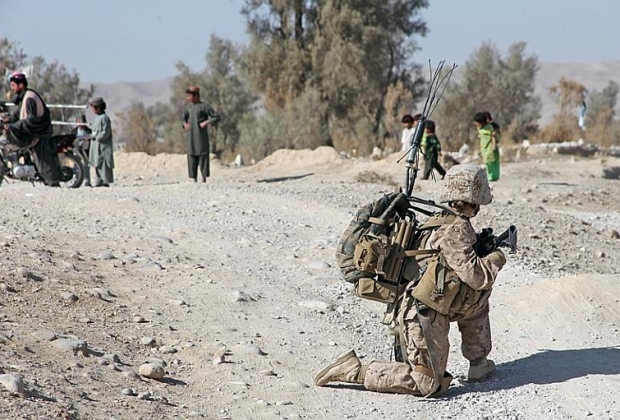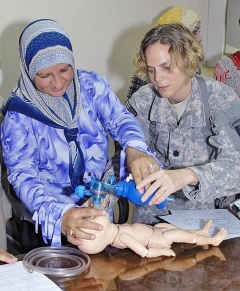Task force aims to reduce urinary tract infections among deployed women

She’s in a convoy, surrounded by men, in an intemperate land with little cover. Stepping off the road could get her blown up. And now she has to pee.
It’s happened untold times to female troops over the past decade in Iraq and Afghanistan. It’s not just uncomfortable; it’s a health hazard.
Suppressing urination, limiting fluids to avoid having to go and primitive bathroom facilities have all contributed to a high rate of urinary tract infections suffered by deployed women.
Nearly half of 850 women surveyed in 2000 for a study of women’s perceptions of their health care while deployed said they’d had symptoms of UTIs or vaginitis while deployed, according to an Army report released by a new task force on women’s health earlier this year. Many of them declined to seek medical treatment, risking complications like kidney disease and pelvic infections.
Although troubling, the results were not surprising, at least among military experts in women’s health. Prevalent genitourinary problems among deployed women and their difficulties in getting treatment has been documented before.
“It’s in the literature since Desert Storm,” said Lt. Col. Lori Trego, a clinical research nurse, co-author of the report and a member of the task force. “But there’s not been a lot of attention given to it.”
That’s started to change.
The Army Women’s Health Task Force, formed last year, has recommended changes and initiatives based on the report. Some of those recommendations are about to be implemented, officials said.
Devices that allow women to urinate discreetly will be made widely available before or while they’re deployed. Self-diagnosis kits to let women test themselves for urinary and vaginal infections are planned by next year.
The kits are designed to address the fact that significant numbers of women won’t seek medical attention for genitourinary issues while deployed. Female troops “lacked confidence” in their providers, who were usually male medics, the report said. They had doubts about confidentiality, felt awkward seeing someone they knew, preferred a female provider and said clinics in the field lacked privacy.
The kits should be available in downrange pharmacies by the end of 2013, Army Medical Command officials said. No pelvic exam would be required.
The kits, now in development, will include a thermometer, a urine collection cup and “a decision-making algorithm to determine type of vaginitis,” the medical command said.
“It’s not as simple as going to Wal-Mart and picking something off the shelf,” Trego said. Test results are to be brought to a health care provider for appropriate treatment.
One task force recommendation really is that simple: the deployment downrange of the “Female Urinary Diversion Device.”
A popular brand, the Freshette, is sold by Amazon and REI for about $25, mostly to campers and hikers. It’s a “lightweight, palm-sized, reusable device,” according to the REI website, that consists of a cup and a flexible tube. It allows women to urinate standing up, without disrobing and to “avoid hazards like unsanitary restrooms, uneven terrain, poison oak and ivy and rough weather.”
Military women familiar with the Freshette swear by it.
“(T)his product makes my life so much easier – I am able to just open a Humvee door, unbutton my pants, and go,” one sergeant on her third deployment, who bought her own, wrote to the Freshette website.
The devices are already in the Army supply system, Trego said. It’s just that soldiers and their commanders often don’t know that.
Some savvy commanders ordered the devices for all their female soldiers, Trego said. “Others said, ‘I’ve never heard of it.’”
Female soldiers overall were ill-equipped to deal with their own health issues on deployment, the report said, because of “a lack of consistent and timely education for women’s health issues and how they are impacted by deployment.”
Eight out of nine women in a 2007 study done by Trego “emphatically stated that there were no positive aspects to menstruation during deployment.” They said they found that their periods were longer and more painful, at the same time that heat and sweat, convoys, porta-potties and irregular access to showers complicated hygiene.
Women can safely reduce or eliminate their periods for an entire deployment with birth control pills and other methods. But female soldiers often knew little about menstrual suppression because medical providers never discussed it. That should change, the recent report said.
Men should also become more educated in female health, the report said. Instruction should be provided in single-sex settings to all soldiers to “improve their comprehension of women’s health issues and foster respect among members of a unit.”
According to the Army Medical Command, that’s also in the works.
“Content for education curriculum has been developed for soldiers, leaders and providers and will be incorporated into their classes over the next year,” Army Medical Command public affairs officials said in an email, declining to offer details.
According to Trego, male commanders and noncommissioned officers are unruffled by the prospect of becoming more involved in their female soldiers’ health. “When I speak with company commanders and line units, they are willing,” she said. “It’s not a taboo topic.”
The effort to address female soldiers’ health needs comes after about 275,000 women have deployed over the last decade, and as new occupational specialties and positions open to women and put more of them on the front lines.
It comes as the Army is starting to give women better-fitting body armor and combat uniforms, and women are rising through the chain of command.
Lt. Gen. Patricia D. Horoho, the Army’s first female surgeon general, created the task force.
“I think we just take those concerns seriously, and we’re in a position to push them,” said Rep. Niki Tsongas, a Massachusetts Democrat, who’s been instrumental in legislation mandating development of better, lighter body armor.
“In general ... we’re the ones to bring attention to the issues of women and families.”











